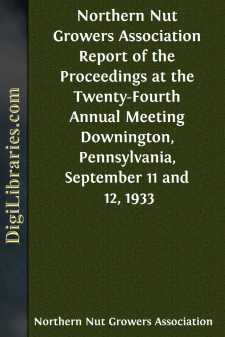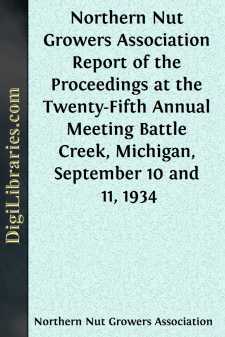Periodicals
- Art 27
- Children's periodicals 59
- Entertainment 5
- Food/Wine 2
- Games/Humor 455
- General
- Health 1
- History 53
- House/Home 1
- Regional 62
- Science/Nature 118
- Transportation 10
General Books
Sort by:
by:
Various
THE NEW MARVEL IN PHOTOGRAPHY. A VISIT TO PROFESSOR RÖNTGEN AT HIS LABORATORY IN WÜRZBURG.—HIS OWN ACCOUNT OF HIS GREAT DISCOVERY.—INTERESTING EXPERIMENTS WITH THE CATHODE RAYS.—PRACTICAL USES OF THE NEW PHOTOGRAPHY. By H.J.W. Dam. PICTURE OF AN ALUMINIUM CIGAR-CASE, SHOWING CIGARS WITHIN. From a photograph by A.A.C. Swinton, Victoria Street, London. Exposure, ten minutes. N all the history of...
more...
The Manor of Stoke, with its magnificent mansion and picturesque park, is situate near the village of Stoke Pogeys, in the county of Buckingham, four miles north-west of Windsor. About two miles distant from Stoke lies the village of Slough, rendered famous by the residence of the celebrated astronomer, Sir William Herschel, and a short way further, on a gentle slope continued the whole way from Stoke,...
more...
by:
Various
ST. DUNSTAN'S, FLEET STREET. No church in London is perhaps better known than the above, which is distinctively called Saint Dunstan's in the West. External elegance has little to do with this celebrity, which has been acquired by the two wooden figures placed on a pediment in front, representing savages, who indicate the hours and quarters by striking a bell with their clubs: this has caused...
more...
by:
Various
THE STORY OF JOSIAH HENSON No one ever uttered a more forceful truth than Frederika Bremer when she said in speaking to Americans: "The fate of the Negro is the romance of your history." The sketches of heroes showing the life of those once exploited by Christian men must ever be interesting to those who would know the origin and the development of a civilization distinctly American. In no case...
more...
CONSTITUTION Article I Name. This Society shall be known as the Northern Nut Growers Association, Incorporated. Article II Object. Its object shall be the promotion of interest in nut-bearing plants, their products and their culture. Article III Membership. Membership in this society shall be open to all persons who desire to further nut culture, without reference to place of residence or nationality,...
more...
by:
George Bell
PARTY-SIMILES OF THE SEVENTEENTH CENTURY—NO. I. "FOXES AND FIREBRANDS." NO. II. "THE TROJAN HORSE." With Englishmen, at least, the seventeenth was a century pre-eminent for quaint conceits and fantastic similes: the literature of that period, whether devotional, poetical, or polemical, was alike infected with the universal mania for strained metaphors, and men vied with each other in...
more...
by:
Various
LINCOLN'S ELECTION TO THE TENTH ASSEMBLY.—ADMISSION TO THE BAR.— REMOVAL TO SPRINGFIELD. HE first twenty-six years of Abraham Lincoln's life have been traced in the preceding chapters. We have seen him struggling to escape from the lot of a common farm laborer, to which he seemed to be born; becoming a flatboatman, a grocery clerk, a store-keeper, a postmaster, and finally a surveyor. We...
more...
The first session convened at 9:30 A. M., September 10, at the Kellogg Hotel with President Frey in the chair. The President: This is the twenty-fifth annual convention of the Northern Nut Growers' Association, our silver anniversary. Fifteen years ago the convention was held in this city. We are glad to be back again and happy to have with us Mr. W. K. Kellogg who has consented to extend a...
more...
by:
Various
PERIPLUS OF HANNO THE CARTHAGINIAN. I am not sufficiently Quixotic to attempt a defence of the Carthaginians on the western coast of Africa, or any where else, but I submit that the accusation brought against them by Mr. S. Bannister, formerly Attorney-General of New South Wales, is not sustained by the only record we possess of Hanno's colonising expedition. That gentleman, in his learned Records...
more...
Sir, I have the honour to submit the following report of the activities of the National Library Service. The report covers the work of the Service as a whole and its four divisions—Country Library Service, School Library Service, Library School, and National Library Centre. The functions of the Service may be summed up as the provision of such assistance to any New Zealand library maintained directly...
more...











